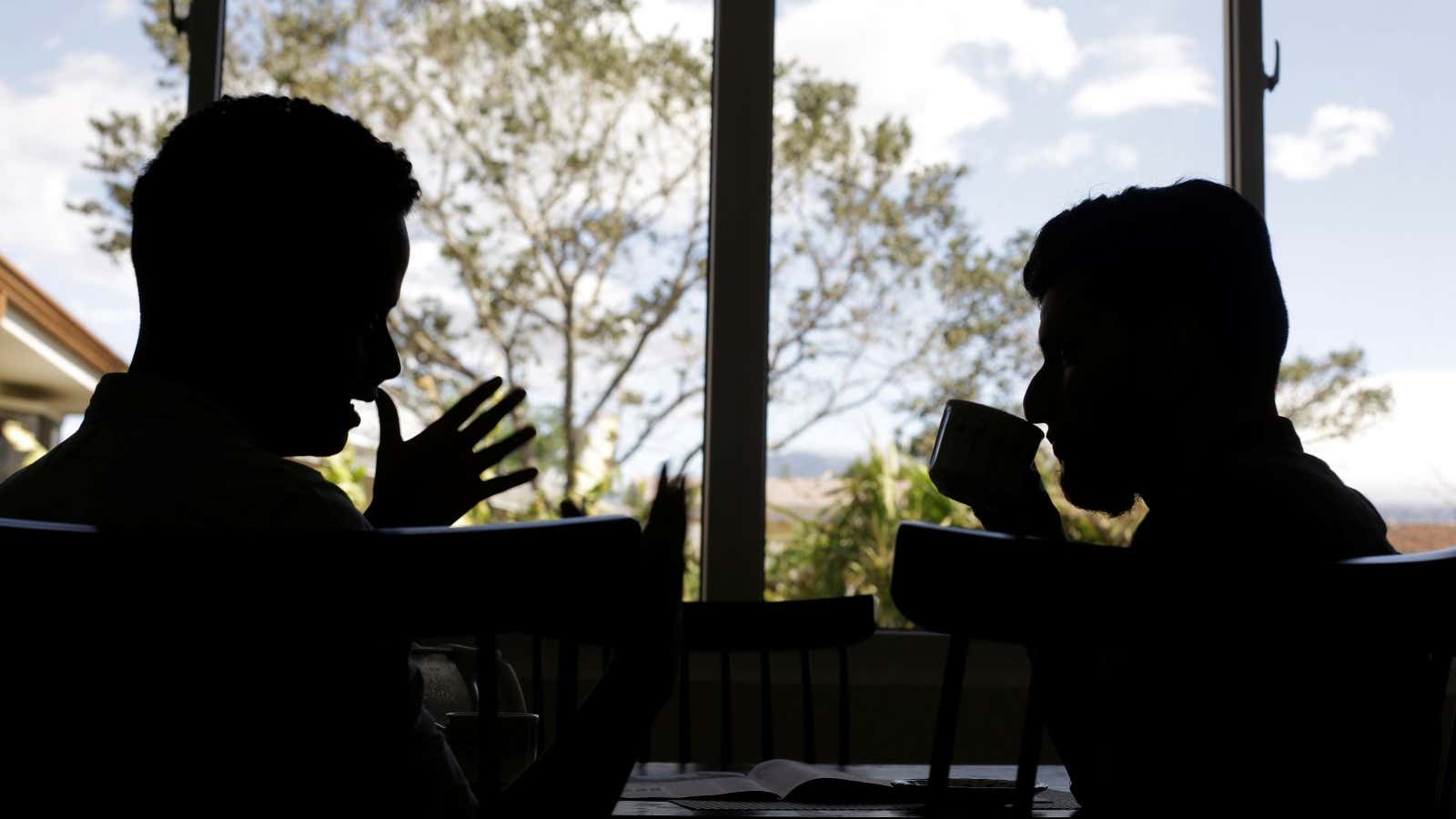American men’s hidden crisis, Slate tells us, is that they need more friends. At the same time, society tells men that friendship is girly—and men respond by not having friends. So perhaps it’s unsurprising that loneliness, not obesity or smoking, is the biggest threat to men’s health, per the Boston Globe.
But what is it that stops men from making and maintaining long-term friendships? Especially when women are more likely to juggle full-time jobs, childcare, housework, emotional labor, and everything in between?
It’s a question that Vox Media founder and editor Ezra Klein unpacks on ”Call Your Girlfriend,” a popular feminist podcast. For their 4/20 episode, co-hosts Ann Friedman and Aminatou Sow invited listeners to “Ask A Man” anything they’d like. One listener asked, “Why are men so shit at friendship?”
“That’s an important question,” Klein replied. “Because we literally are—it is literally the case that men have fewer friends than women, and as we get older we have fewer, and fewer, and fewer friends. Some of us have no friends at all, and the resulting loneliness becomes a huge health risk.”
Empirical evidence supports Klein’s argument. A 2006 analysis of two decades of survey data on social isolation, published in the American Sociological Review, found that adult, white, heterosexual men have the fewest friends of all people in America. Moreover, as Occidental sociologist Lisa Wade explains in Salon, “the friendships they have, if they’re with other men, provide less emotional support and involve lower levels of self-disclosure and trust than other types of friendships.”
This male-female friendship divide isn’t about biology—it’s the result of what we teach young men about masculinity. When NYU psychologist Niobe Way began researching friendship among male teenagers, she found that boys and girls are equally likely to talk about personal feelings with their same-sex friends. The change comes at around age 15, when boys start reporting that they don’t have or need many friends. That’s the same age that boys’ suicide rate increases to four times the rate of girls.
“During these years, young men are learning what it means to be a ‘real man.’ The #1 rule: avoid everything feminine,” writes Wade in Salon. “To be close friends, men need to be willing to confess their insecurities, be kind to others, have empathy and sometimes sacrifice their own self-interest. ‘Real men,’ though, are… supposed to be self-interested, competitive, non-emotional, strong (with no insecurities at all), and able to deal with their emotional problems without help. Being a good friend, then, as well as needing a good friend, is the equivalent of being girly.”
Klein says his boyhood friendships lost their intimacy as he aged—not just because sharing feelings felt “girly,” but also because they were based on activities:
There’s a lot more discomfort, particularly among young men, with friendships that are [rooted in] talking about what’s going on in your life, and talking about how you’re feeling. But if your friendship is based on activities—on hanging out, playing video games, doing sports, or whatever manly things we’re supposed to be doing—then as your life changes, as you move away, have children, or you get married, and you have a job, then how do you keep those friendships up? Because the material that they were based on is no longer there. And so the friendships fall away.
In contrast, Klein notes that friendships among women in his life are almost always rooted in dialogue, not activity. “If you’re able to have conversations on the phone, and if the material of your friendship is actually what’s going on in your life and what that means to you… then distance and changes aren’t as threatening,” he says.
In his book Buddy System: Understanding Male Friendships, therapist and friendship scholar Geoffrey Greif explains how men rely on “shoulder-to-shoulder” friendships (doing things together), while women enjoy “face-to-face” friendships (honestly sharing thoughts and emotions).
When Klein left college and moved to Washington DC, he recalls in the interview, his male friends soon felt more like acquaintances:
[Intimacy] just didn’t seem normal, it didn’t seem natural, it didn’t seem like it would be accepted. I haven’t had friends for a very long time where it would be normal for me to call them on the phone. And I can’t really explain why that is, but it’s a real problem. And this is a place where men have a ton to learn from women.
Again, this anecdotal point is supported by research. Robin Dunbar, an evolutionary biologist at Oxford, found that men tend to establish deep friendships during periods of intense engagement, like school, military service, or sports. “The caricature is if you move away to another town girls will be on the phone or Facebook with each other to keep the relationship going,” Dunbar told the Times. “With guys, it is out of sight out of mind. They just find four more guys to go drinking with.”
This isn’t what men actually want. Research shows that men are just as likely as women to say they want emotional intimacy in their friendships. And lacking this intimacy threatens men’s health: Recent research links the “loneliness epidemic” with early deaths across wealthy nations, and groundbreaking 2017 meta studies established that greater social connection was associated with a 50% reduced risk of dying early, while loneliness increased the risk of dying younger as severely as obesity.
That’s just deeply sad—an example, as Klein says, of “how the patriarchy fails men, too.”
“It hurts our happiness in life, it hurts our health, it changes our life prospects, and it sucks,” he says in the interview. “It sucks to not have people to tell about what’s going on with you. We should not be so caught up in the stereotypes of what maleness is supposed to be that we cannot have relationships with people that are about our own lives. It’s just weird.”




